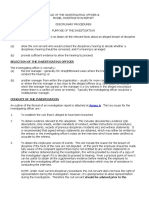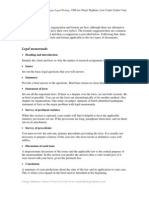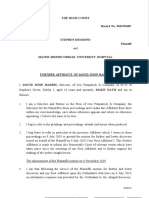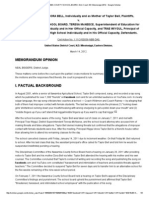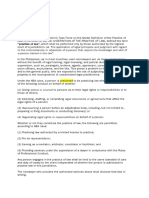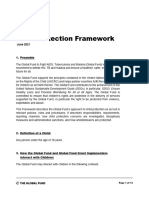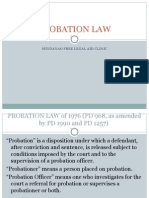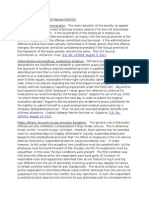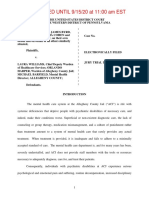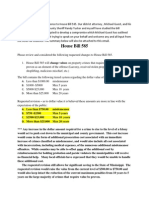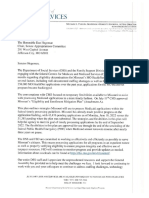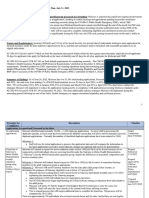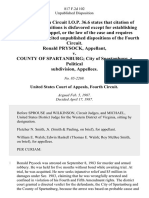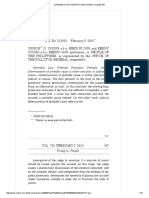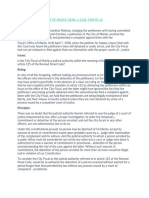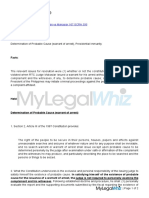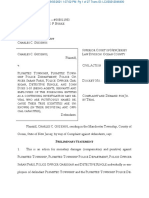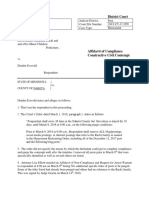Professional Documents
Culture Documents
Interim Day One Policies
Uploaded by
Sam ClancyCopyright
Available Formats
Share this document
Did you find this document useful?
Is this content inappropriate?
Report this DocumentCopyright:
Available Formats
Interim Day One Policies
Uploaded by
Sam ClancyCopyright:
Available Formats
INTERIM OFFICE POLICIES
Effective January 2, 2019
OVERVIEW & PURPOSE
To provide guidance for Assistant Prosecuting Attorneys (“APAs”), Investigators and
Support Staff in the daily operation of the office as the new administration continues the
discussion and development of policies. Of utmost importance to the new administration
is the receipt of feedback from current employees prior to the finalization of policies.
All policies outlined herein are guided by the United States and Missouri Constitutions,
Missouri Rules of Criminal Procedure, Statutes and case law, as well as the Missouri
Rules of Professional Conduct and the ethical obligations we share as a community in the
K
ongoing pursuit of making St. Louis County a safe and prosperous place in which to live.
For purposes of interim policy, “team leader” or “supervisor” is the same team
D
leader/supervisor to whom attorneys/investigators/support staff have already been
assigned unless/until otherwise noted.
For purposes of interim policy, “written approval” includes, but is not limited to: e-mails
KS
to/from employees’ approved St. Louis County e-mail address(es).
BAIL/BOND
Note: on December 18, 2018, the Missouri Supreme Court adopted revisions to Rules of
Criminal Procedure. While the new rules are effective July 1, 2019, this office has based its
Interim Office Policies on the new rules, effective immediately. These policies, based on the
new rules, will be the basis for all recommendations to the court.
Misdemeanor Offenses
APAs shall request summons, and not warrants, on all misdemeanor offenses. APAs
shall not request cash bond for any misdemeanor offense absent first obtaining written
approval from a supervisor.
- Note: immediate action - At the request of defense counsel, APAs shall agree to a
recognizance bond for any individual currently incarcerated on misdemeanor
Internal Office Discussion/Circulation Only
offenses, absent finding any of the exceptions below.
Exceptions: If an APA determines the answer to any of the questions enumerated below
is “yes,” APA shall obtain written approval from a supervisor in writing prior to issuance
of a warrant/request for cash bond.
1. Does a witness and/or victim exhibit signs of physical injury, and
2. Does clear and convincing evidence exist to determine there is a danger to a
witness and/or victim that cannot be alleviated by conditions of release, including,
but not limited to: an order or protection?
D and E Felony Offenses
APAs shall request summons, and not warrants, on all D and E felony offenses. APAs
shall not request a warrant or cash bond for any D or E felony offense absent first
obtaining written approval from a supervisor.
-
K
Note: immediate action - APAs will produce a list of cases on which an individual
is confined on D and E felonies no later than January 11, 2019.
Note: immediate action - At the request of defense counsel, APAs will agree to
D
recognizance bonds on said cases absent finding one of the exceptions below.
Exceptions: If an APA determines the answer to any of the questions enumerated below
is “yes,” APA must obtain written approval from a supervisor in writing prior to issuance
KS
of a warrant/request for cash bond.
1. Was there a direct threat to a witness and/or victim before/during/after arrest?
2. Is there more than one prior conviction involving the same victim?
3. Were there more than two failures to appear within the last two years?
a. If so, does information show that failures to appear were in an effort to
avoid prosecution, such as evading the police upon arrest or using an alias
in a police encounter?`
If exceptions met, then: when requesting an initial warrant, APA shall ask for least
restrictive conditions available.
- Note: APAs must make good faith effort to contact the victim prior to issuance of
warrant/request for cash bond to avoid necessity of requesting an additional five
days prior to addressing bond review upon arrest.
- Note: should an accused remain incarcerated at a bond review hearing solely due
to monetary bond condition, a rebuttable presumption exists that the accused
Internal Office Discussion/Circulation Only
cannot afford the monetary condition and the APA must request an alternative
condition of release
Violation of Conditions of Release - All Offenses
APAs will review prior conditions of release when there has been a failure to appear on
an open case. Absent evidence the accused intentionally attempted to flee from law
enforcement, such as evading the police upon arrest or using an alias in a police
encounter, then release upon the original conditions will be recommended.
APAs will not ask for cash bond as an additional condition to ensure return to court. Any
request for monetary conditions based solely on a failure to appear requires written
approval from a supervisor.
ISSUANCE OF CHARGES
K
APAs will issue only the charges which, based on the APA’s good faith belief, can be
proven beyond a reasonable doubt on the date of filing, and not the charges for which
only probable cause can be met.
D
Specifically, APAs shall not seek to “overcharge” at the stage of the initial
summons/warrant/indictment phase to pressure the accused to admit guilt.
KS
Note: this policy also precludes APAs from adding additional counts or increasing the
potential range of punishment when the accused exercises his/her constitutional rights;
including, but not limited to: preliminary hearings, motions to suppress, depositions,
negotiations and other pre-trial hearings. Ex.: APAs shall not threaten to “send the case
back to grand jury,” or “charge the defendant as prior and persistent” simply because the
accused has exercised the rights guaranteed to him/her under both United States and
Missouri Constitutions.
DISCOVERY
“Open file policy” means the entire contents of the APA’s file, with the exception of work
product, shall be furnished to defense counsel when fulfilling discovery requests
pursuant to Missouri Supreme Court Rule 25.02; including, but not limited to: all
police/incident reports and supplements, witness interview notes, restitution
valuation(s), audio and video recordings, and the accused’s criminal history. Said
discovery may be furnished via advanced hand delivery of a hard copy or via the
Internal Office Discussion/Circulation Only
preferred method of an electronic copy using the defense attorney’s Missouri Bar
Association e-mail address.
The above-articulated policy applies regardless of the stage of criminal proceeding (both
associate and circuit court).
APAs will abide by their ongoing duty of disclosure, which exists from the inception of
the case until disposition, and cannot be negated at any point therein.
See: Brady v. Maryland, Missouri Supreme Court Rules 25.02, 25.03, 25.07, 25.08
PRELIMINARY HEARING
APAs will not object to defense counsel’s request to record Preliminary Hearing(s), via a
licensed court reporter or audio recording via the Associate Court with the court’s
permission.
K
APAs will not request or require defense counsel to waive an accused’s right to
Preliminary Hearing as a condition of or exchange for the accused’s release from custody
D
and/or waiver of the accused’s other constitutionally protected due process rights.
If a case is dismissed after Preliminary Hearing for lack of probable cause, APAs shall not
re-issue the case without written approval in writing from his/her supervising attorney.
KS
WITNESSES / VICTIMS
Note: while Victims Services Division is responsible for handling the majority of
interaction(s) with witnesses/victims, said division, practically speaking, cannot be
responsible for ALL interactions with witnesses/victims, and it is this premise upon which
the Interim Office Policy is articulated. The ongoing development of additional victims
services is forthcoming, after the new administration has received input from current
employees. While the office’s sympathy and compassion toward witnesses/victims cannot
be understated, it is important to recall the ethical rules and state law which establish
certain limitations. Specifically, employees of this office represent The State of Missouri,
and thus it would be improper for employees to provide witnesses/victims with legal advice.
Employees will not attempt to threaten witnesses and/or victims in an effort to force
them to participate in prosecution. APAs will not deny witnesses and/or victims the
opportunity to complete an Affidavit of Non-Prosecution if such a request is received.
Internal Office Discussion/Circulation Only
Specifically, employees shall not: communicate or imply the witness/victim will face civil
or criminal charges for failure to appear in court/cooperate with prosecution;
communicate or imply loss of child custody or visitation rights for failure to appear in
court/cooperate with prosecution; communicate or imply loss of licensure or other
collateral legal consequences for failure to appear in court/cooperate with prosecution.
MARIJUANA
This office will not prosecute the possession of less than 100 grams of marijuana in any
capacity. Prosecution of more than 100 grams of marijuana will only be pursued if
evidence suggests the sale/distribution of marijuana. APAs will not issue cases, apply for
summons or warrants for possession of 100 grams or less of marijuana.
Pending cases: APAs will not proceed with or attempt to accept any plea/finding of guilt
K
for felony or misdemeanor marijuana possession, regardless of amount, without written
approval from supervisor.
- Note: immediate action - APAs will file Nolle Prosequis for every pending felony
D
and misdemeanor marijuana possession case no later than January 11, 2018.
- Note: immediate action - APAs will not to request capias warrants for failure(s) to
appear on possession of marijuana matters.
KS
Probation violation matters: APAs will not file or pursue Motions to Revoke Probation
arising solely from the use or possession of marijuana.
Conditions of bail/bond: APAs will not file or pursue Motions to Revoke Bond arising
solely from the use or possession of marijuana.
CRIMINAL NON-SUPPORT
Note: this office will enforce child support orders via civil mechanisms already in place.
The loss of liberty and/or employment opportunities due to the filing of criminal charges
only ensures the subject of the civil order will have greater difficulty operating as a
productive member of society, and thus, would not be able to provide said support.
This office will not criminally prosecute the failure to pay child support. APAs will not
issue criminal cases or apply for summons or warrants for failure to pay child support.
Pending cases: APAs will not proceed with or attempt to accept any plea/finding of guilt
Internal Office Discussion/Circulation Only
for any felony or misdemeanor failure to pay child support, regardless of amount of
arrears, without written approval from a supervisor.
Probation violation matters: APAs will not file or pursue Motions to Revoke Probation
arising solely from the failure to pay child support.
Immediate Action
- APAs shall not request capias warrants for failure(s) to appear on criminal
non-support matters, whether felonies or misdemeanors.
- APAs shall recommend termination/discharge of probation for anyone supervised
solely relating to failure to pay child support, whether felony or misdemeanor
supervision.
- In the absence of termination/discharge, APAs will agree to a recognizance bond
for anyone in custody solely for probation violation relating to failure to pay child
support, whether felony or misdemeanor supervision.
-
K
APAs will not file or pursue Motions to Revoke Bond arising solely from failure to
pay child support.
D
Note: APAs currently assigned to criminal non-support to draft suggestions or outline
plan to pursue the failure to pay child support via a civil contempt docket prior to
finalization of future policy.
KS
LEGAL FINANCIAL OBLIGATIONS (“LFOS”) / RESTITUTION
Probation violation matters: APAs will not pursue Motions to Revoke Probation arising
solely from failure to pay legal financial obligations and/or restitution unless a hearing
has been held regarding the defendant’s ability to pay and the court has made a ruling
finding willful nonpayment.
Legal financial obligations (“LFOs”) include, but are not limited to: court costs,
intervention fees, fees associated with conditions of supervision (ex. electronic home
detention).
Immediate Action
- APAs will not request warrants/cash bond for probation violations/violations of
bond arising solely from failure to pay LFOs or restitution
- APAs will agree to recognizance bond(s) for anyone in custody solely for
probation violation(s) relating to failure to pay LFOs, whether felony or
Internal Office Discussion/Circulation Only
misdemeanor supervision
- APAs to agree to recognizance bond(s) for anyone in custody solely for probation
violation(s) relating to failure to pay restitution, whether felony or misdemeanor
supervision
PROBATION CLASSIFICATION & TERMS
Felony Probation: APAs will not seek more than three years of probation, whether
supervised or unsupervised, SIS or SES.
- Note: immediate action - for probation recommendations already extended,
recommendation is automatically converted to three year probation term.
Misdemeanor Probation: APAs will not seek more than one year of probation, whether
supervised or unsupervised, SIS or SES.
K
Note: immediate action: for probation recommendations already extended,
recommendation is automatically converted to one-year probation term.
D
MEDIA / PUBLIC STATEMENTS
Employees of the St. Louis County Prosecuting Attorney’s Office, whether civil service or
KS
appointed, attorney, investigator, or support staff, will not comment to the press about
any matter relating to this office, including, but not limited to: personnel, pending
criminal cases or policy. Any questions or inquiries from the press about any matter
related to the office, including trials, shall be referred to Chief of Staff, Sam Alton,
unless/until otherwise instructed.
For purposes of this policy, any “posts” on social media, including but not limited to:
Twitter, Facebook and Instagram, are considered public comment and thus employees
are not permitted to post about any matter as it relates to personnel, pending criminal
cases or policy relating to this office.
Internal Office Discussion/Circulation Only
You might also like
- Rules of Civil Procedure ProvisionsDocument21 pagesRules of Civil Procedure ProvisionsRenz AmonNo ratings yet
- Bill of Rights protectionsDocument16 pagesBill of Rights protectionsJulius MilaNo ratings yet
- CLJ 1 - Module 6Document8 pagesCLJ 1 - Module 6Sy Benitez EnriquezNo ratings yet
- Zoom Class Action - Proposed Settlement Agreement July 2021Document37 pagesZoom Class Action - Proposed Settlement Agreement July 2021File 411No ratings yet
- Role of investigating officerDocument3 pagesRole of investigating officerBen100% (1)
- PCSO Charity Assistance Services GuideDocument9 pagesPCSO Charity Assistance Services GuidephenorenNo ratings yet
- Chapter Assignment - Week 1 Legal AnalysisDocument7 pagesChapter Assignment - Week 1 Legal AnalysisUmesh SharmaNo ratings yet
- 2019 Revised Rules of Civil Procedure Rules 9 To 11Document5 pages2019 Revised Rules of Civil Procedure Rules 9 To 11Aura Garcia-GabrielNo ratings yet
- Civil Service Law OverviewDocument43 pagesCivil Service Law OverviewMark William S. MidelNo ratings yet
- DBS Declaration FormDocument5 pagesDBS Declaration Formakshay12489No ratings yet
- Re Residential Tenancies - See Public Crevier) : Baker V Canada (1999)Document41 pagesRe Residential Tenancies - See Public Crevier) : Baker V Canada (1999)Chamil JanithNo ratings yet
- Legal MemorandaDocument6 pagesLegal MemorandaJane Hazel GuiribaNo ratings yet
- #17-013 Rush - Arbitration Opinion & Award - Redacted DecisionDocument80 pages#17-013 Rush - Arbitration Opinion & Award - Redacted Decisionjckc107l100% (2)
- Assignment of IghtsDocument7 pagesAssignment of IghtsVedant TapadiaNo ratings yet
- Swient Notice of Privacy Practices v1Document2 pagesSwient Notice of Privacy Practices v1contagious4No ratings yet
- March 2013 Board of Nursing NoticesDocument528 pagesMarch 2013 Board of Nursing NoticesJames LindonNo ratings yet
- Admin Cases Summary PDFDocument27 pagesAdmin Cases Summary PDFabigailNo ratings yet
- 154531948lifelock Optout For LawEnforcement PDFDocument4 pages154531948lifelock Optout For LawEnforcement PDFmrelfeNo ratings yet
- Further Affidavit of David John Harris - 2824065 - 2824250Document10 pagesFurther Affidavit of David John Harris - 2824065 - 2824250desmsteNo ratings yet
- Rule 57Document18 pagesRule 57VioletaSantosNo ratings yet
- Termination Letter Sent To Charles NegyDocument2 pagesTermination Letter Sent To Charles NegyAdrienneNo ratings yet
- Notice of Proposed Rulemaking - Rhode Island Police Body-Worn CamerasDocument15 pagesNotice of Proposed Rulemaking - Rhode Island Police Body-Worn CamerasNBC 10 WJARNo ratings yet
- Brian Booth - Plea AgreementDocument11 pagesBrian Booth - Plea AgreementWashington ExaminerNo ratings yet
- Mandatory Continuous TrialDocument8 pagesMandatory Continuous TrialdollyccruzNo ratings yet
- Chapter 8 - Parole Operations Article 1 - Release ProceduresDocument182 pagesChapter 8 - Parole Operations Article 1 - Release ProceduresgschmidtkeNo ratings yet
- Bell V Itawamba County School Board DistDocument6 pagesBell V Itawamba County School Board Distapi-245231397No ratings yet
- NCAS Employer English Proficiency Reference FormDocument3 pagesNCAS Employer English Proficiency Reference FormElliot CiscoNo ratings yet
- "Practice of Law", Which Shall Be Performed Only by Those Authorized by The HighestDocument13 pages"Practice of Law", Which Shall Be Performed Only by Those Authorized by The HighestNoel Alberto OmandapNo ratings yet
- Notice of Privacy Practices Regarding Protected Health InformationDocument5 pagesNotice of Privacy Practices Regarding Protected Health InformationDanny LopezNo ratings yet
- Hamilton Township (Atlantic County) OPRA FormDocument4 pagesHamilton Township (Atlantic County) OPRA FormThe Citizens CampaignNo ratings yet
- Right To BailDocument11 pagesRight To BailabiramibablNo ratings yet
- United States v. Allison, 10th Cir. (2001)Document4 pagesUnited States v. Allison, 10th Cir. (2001)Scribd Government DocsNo ratings yet
- Blank Speedy Trial MotionDocument3 pagesBlank Speedy Trial MotionsakokushNo ratings yet
- POWERS OF HIGH COURTS IN INDIA UNDER SECTION 482Document9 pagesPOWERS OF HIGH COURTS IN INDIA UNDER SECTION 482sai kiran gudiseva100% (1)
- Moral Character Determination Application InstructionsDocument11 pagesMoral Character Determination Application InstructionsAdam CohenNo ratings yet
- 2018-19 Civil Grand Jury Report - Riverside County Human Resources and County CounselDocument16 pages2018-19 Civil Grand Jury Report - Riverside County Human Resources and County CounselThe Press-Enterprise / pressenterprise.comNo ratings yet
- Tutorial Letter 102/3/2020: Civil ProcedureDocument43 pagesTutorial Letter 102/3/2020: Civil ProcedureHarry Wang100% (1)
- Core Child-Protection Framework enDocument13 pagesCore Child-Protection Framework enJazNo ratings yet
- Elliot Sgargetta Statement of Claim and ChronologyDocument11 pagesElliot Sgargetta Statement of Claim and ChronologySenateBriberyInquiryNo ratings yet
- Nursing License Suspended Dumm 3Document5 pagesNursing License Suspended Dumm 3Kristin NelsonNo ratings yet
- Probation LawDocument20 pagesProbation LawCoyzz de Guzman100% (1)
- Forensics Training Masterclass Module - 4Document24 pagesForensics Training Masterclass Module - 4AbdelAziz AkashiwoueNo ratings yet
- Grievance ProcedureDocument23 pagesGrievance ProcedureJoy RamosNo ratings yet
- Chapter 3Document23 pagesChapter 3Kath KathNo ratings yet
- Spencer Barasch Application For Reinstatement Before SECDocument10 pagesSpencer Barasch Application For Reinstatement Before SECMichael LindenbergerNo ratings yet
- Dawn Raid ProcedureDocument2 pagesDawn Raid ProcedureHiro Ng100% (1)
- Claim Form For Secure Mind PolicyDocument4 pagesClaim Form For Secure Mind PolicyRamya RaviNo ratings yet
- Council Reply - Complaint 7 Nov 11Document4 pagesCouncil Reply - Complaint 7 Nov 11MiscellaneousNo ratings yet
- SY 20 21 Public Health GuidanceDocument3 pagesSY 20 21 Public Health GuidancePeopleNewspapersDallasNo ratings yet
- Administrative Law (Polirev092015)Document7 pagesAdministrative Law (Polirev092015)Jose Maria Jude DuremdesNo ratings yet
- Winding Up ProcedureDocument1 pageWinding Up ProcedureFatin Abd WahabNo ratings yet
- Preparing witness and suspect listsDocument32 pagesPreparing witness and suspect listsAbdelAziz AkashiwoueNo ratings yet
- Legal Ethics No. 5Document27 pagesLegal Ethics No. 5abbyhwaitingNo ratings yet
- Inmates' Lawsuit Against Allegheny County Jail (Full Text)Document60 pagesInmates' Lawsuit Against Allegheny County Jail (Full Text)jmicekNo ratings yet
- Colorado v. MarletteDocument10 pagesColorado v. MarletteBrian KnightNo ratings yet
- 2014 House Bill 585 (Requested Revisions)Document5 pages2014 House Bill 585 (Requested Revisions)the kingfishNo ratings yet
- Admin DisciplineDocument69 pagesAdmin Disciplinefranco jubiloNo ratings yet
- Administrative DisciplineDocument44 pagesAdministrative DisciplineJhun BautistaNo ratings yet
- Greennotes Ethics 1Document41 pagesGreennotes Ethics 1Glaiza Mae MasaoyNo ratings yet
- Police Logs To Shell Gas StationDocument23 pagesPolice Logs To Shell Gas StationSam ClancyNo ratings yet
- Traffic Deaths in St. Louis Per MoDOTDocument1 pageTraffic Deaths in St. Louis Per MoDOTSam ClancyNo ratings yet
- Alderman Tom Oldenburg's Statement On Kim GardnerDocument1 pageAlderman Tom Oldenburg's Statement On Kim GardnerSam ClancyNo ratings yet
- Signed Juvenile Intake MOUDocument2 pagesSigned Juvenile Intake MOUSam ClancyNo ratings yet
- Government's Sentencing Memorandum of Tony WeaverDocument6 pagesGovernment's Sentencing Memorandum of Tony WeaverSam Clancy100% (1)
- SCI Engineering Proposal Nov. 11Document2 pagesSCI Engineering Proposal Nov. 11Sam ClancyNo ratings yet
- Motion For Sanctions GardnerDocument12 pagesMotion For Sanctions GardnerSam ClancyNo ratings yet
- Israel Visa Waiver Program Letter To State and Homeland SecurityDocument5 pagesIsrael Visa Waiver Program Letter To State and Homeland SecuritySam ClancyNo ratings yet
- Class-Action LawsuitDocument40 pagesClass-Action LawsuitKayla GaffneyNo ratings yet
- Mo Ag 2.14.23Document2 pagesMo Ag 2.14.23Sam ClancyNo ratings yet
- SCI Proposal Oct. 24Document2 pagesSCI Proposal Oct. 24Sam ClancyNo ratings yet
- SCI Proposal August 12Document2 pagesSCI Proposal August 12Sam ClancyNo ratings yet
- Impact StatementDocument1 pageImpact StatementSam ClancyNo ratings yet
- House DSS Mitigation Letter 7.19.2022Document2 pagesHouse DSS Mitigation Letter 7.19.2022Sam ClancyNo ratings yet
- Statement From Archbishop RozanskiDocument2 pagesStatement From Archbishop RozanskiSam ClancyNo ratings yet
- Senate DSS Mitigation Plan Letter 7.19.2022Document2 pagesSenate DSS Mitigation Plan Letter 7.19.2022Sam ClancyNo ratings yet
- St. Louis Metropolitan Pandemic Task Force Data For Feb. 17, 2022Document11 pagesSt. Louis Metropolitan Pandemic Task Force Data For Feb. 17, 2022Sam ClancyNo ratings yet
- Hyundai ResponseDocument2 pagesHyundai ResponseSam ClancyNo ratings yet
- Amazon Warehouse Incident ReportDocument5 pagesAmazon Warehouse Incident ReportSam ClancyNo ratings yet
- Letter From Tim Fitch To Sam PageDocument1 pageLetter From Tim Fitch To Sam PageSam ClancyNo ratings yet
- Missouri Eligibility and Enrollment Mitigation Plan 7.11.2022Document7 pagesMissouri Eligibility and Enrollment Mitigation Plan 7.11.2022Sam ClancyNo ratings yet
- Poll Results Deck From Poling Conducted by Former Sen. John DanforthDocument29 pagesPoll Results Deck From Poling Conducted by Former Sen. John DanforthSam ClancyNo ratings yet
- St. Louis Metropolitan Pandemic Task Force Data For Feb. 17, 2022Document11 pagesSt. Louis Metropolitan Pandemic Task Force Data For Feb. 17, 2022Sam ClancyNo ratings yet
- Letter From Sam Page To Hal GoldsmithDocument2 pagesLetter From Sam Page To Hal GoldsmithSam ClancyNo ratings yet
- 2022 STLMD Career Fair FlyerDocument2 pages2022 STLMD Career Fair FlyerSam ClancyNo ratings yet
- 2022 Alzheimer's Disease Facts and FiguresDocument122 pages2022 Alzheimer's Disease Facts and FiguresSam ClancyNo ratings yet
- Task Force Daily Briefing Slides 3/28/2022Document11 pagesTask Force Daily Briefing Slides 3/28/2022Sam ClancyNo ratings yet
- Open Letter To Wentzville School BoardDocument2 pagesOpen Letter To Wentzville School BoardSam ClancyNo ratings yet
- Jerseyville Letter FinalDocument2 pagesJerseyville Letter FinalSam ClancyNo ratings yet
- Southwestern Letter To TeachersDocument1 pageSouthwestern Letter To TeachersSam ClancyNo ratings yet
- Monthly ReportDocument20 pagesMonthly ReportAstina85100% (1)
- Ronald Prysock v. County of Spartanburg City of Spartanburg, A Political Subdivision, 817 F.2d 102, 4th Cir. (1987)Document2 pagesRonald Prysock v. County of Spartanburg City of Spartanburg, A Political Subdivision, 817 F.2d 102, 4th Cir. (1987)Scribd Government DocsNo ratings yet
- Jharkhand Rules Upheld - JudgmentDocument8 pagesJharkhand Rules Upheld - JudgmentLive LawNo ratings yet
- Fed Suit FinalDocument35 pagesFed Suit Finaljerry mcleodNo ratings yet
- Motion For Indefinite Continuance While Deal Is Work Out Sustained in The Matter of State Vs Cody Anthony DupreDocument62 pagesMotion For Indefinite Continuance While Deal Is Work Out Sustained in The Matter of State Vs Cody Anthony DuprethesacnewsNo ratings yet
- Rule 128 129 - 6 Liza Maza Vs Hon. Evelyn TurlaDocument10 pagesRule 128 129 - 6 Liza Maza Vs Hon. Evelyn TurlaMimi AringoNo ratings yet
- 03 Young V PeopleDocument16 pages03 Young V PeoplepNMI2020No ratings yet
- Rights of An Accused Under Custodial InvestigationDocument17 pagesRights of An Accused Under Custodial Investigationadrianfrancis9100% (1)
- De Lima v. GuerreroDocument169 pagesDe Lima v. GuerreroJerald Oliver MacabayaNo ratings yet
- Rule 110 & 11Document34 pagesRule 110 & 11James Ibrahim AlihNo ratings yet
- Ladlad v. Velasco PDFDocument25 pagesLadlad v. Velasco PDFJohzzyluck R. MaghuyopNo ratings yet
- Rule 111 and 112 DigestsDocument15 pagesRule 111 and 112 Digestsjuris_No ratings yet
- MELENCIO SAYO v. CHIEF OF POLICE, GR No. L-2128, 1948-05-12Document2 pagesMELENCIO SAYO v. CHIEF OF POLICE, GR No. L-2128, 1948-05-12Bobet AtendidoNo ratings yet
- Summary of Remedies in Crim ProDocument26 pagesSummary of Remedies in Crim ProjeffreyNo ratings yet
- Emajay Maurice Driver Arrest WarrantDocument6 pagesEmajay Maurice Driver Arrest WarrantFox NewsNo ratings yet
- LECTURE ON CRIMINAL PROCEDURE Intro Rule 116 PDFDocument36 pagesLECTURE ON CRIMINAL PROCEDURE Intro Rule 116 PDFFranz SantosNo ratings yet
- SUMMARY Soliven Vs Makasiar and Beltran Vs Makasiar 167 SCRA 393Document2 pagesSUMMARY Soliven Vs Makasiar and Beltran Vs Makasiar 167 SCRA 393Aiyla AnonasNo ratings yet
- (CPR) Pestilos Vs Generoso, GR No 182601, 10 November 2014 Case DigestDocument3 pages(CPR) Pestilos Vs Generoso, GR No 182601, 10 November 2014 Case Digestarceo.ezekiel0No ratings yet
- 2000 Rodriguez - v. - Bonifacio20210424 12 Hx6ukgDocument29 pages2000 Rodriguez - v. - Bonifacio20210424 12 Hx6ukgethel hyugaNo ratings yet
- Gudehus ComplaintDocument27 pagesGudehus ComplaintAsbury Park PressNo ratings yet
- Supreme Court Affirms Conviction of Two Accused of MurderDocument20 pagesSupreme Court Affirms Conviction of Two Accused of MurderJCapskyNo ratings yet
- PleteDocument169 pagesPleteFedencio Costuna0% (1)
- 428 - International Arrest Warrant Issued Against Pope Francis IDocument3 pages428 - International Arrest Warrant Issued Against Pope Francis IDavid E RobinsonNo ratings yet
- Warrantless Arrest Rules and Exceptions in 40 CharactersDocument4 pagesWarrantless Arrest Rules and Exceptions in 40 CharacterslamadridrafaelNo ratings yet
- DJS 2022-Previous Year Solved Legal BitesDocument58 pagesDJS 2022-Previous Year Solved Legal BitesjatinlegalbitesNo ratings yet
- Crimpro Outline - MidtermsDocument10 pagesCrimpro Outline - MidtermsVictoria EscobalNo ratings yet
- Affidavit of ComplianceDocument2 pagesAffidavit of CompliancemikekvolpeNo ratings yet
- Pearland PD Press Info Week of Oct 25Document18 pagesPearland PD Press Info Week of Oct 25Houston ChronicleNo ratings yet
- Criminal Procedure: San Beda College of LawDocument67 pagesCriminal Procedure: San Beda College of LawMeng GoblasNo ratings yet
- HOME DEVELOPMENT MUTUAL FUND PAG-IBIG FUND v. CHRISTINA SAGUNDocument71 pagesHOME DEVELOPMENT MUTUAL FUND PAG-IBIG FUND v. CHRISTINA SAGUNFaustina del RosarioNo ratings yet




